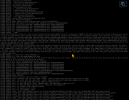I have just built a new server, and installed v8 straight away. Apart from a minor issue with NVMe which seems to be a BIOS related (they appear or not randomly after the POST) I opted to stay safe and installed everything on a single SSD in ext4. Call me old school, I'm fine with that 
So I run v8 for sometime with no issue but one day lots of crashed started. As you can imagine with a brand-new hardware you go fiddling a bit everywhere especially in the BIOS and I started to blame myself to have caused the issue. However, after a BIOS reset to defaults and a fresh installation of v8 the crashes appeared prettuy much immediately.
I read a lot about the crash message and everything suggests it might be a RAM fault, however an extensive overnight RAM test confirmed this not to be the issue. So what changed? The only thing that really came to my mind is: the kernel.
I can't tell for sure what v8 kernel worked and what not. My initial v8 Installation was around 4th Nov 24, and it remained stable until about 10th November when I guess I installed some updates and I can't exclude a new kernel too.
As a POC I wiped everything and installed v7. Guess what? It's super stable.
So a couple of questions here:
- Is it safe for me to now upgrade to v8 but planning to downgrade the kernel?
- What is the correct procedure to list the available kernels I could downgrade to?
- Will the internal Proxmox update always offer to upgrade the kernel even if I pin an old one?
- Am I the only one experiencing this with the latest kernels?
So I run v8 for sometime with no issue but one day lots of crashed started. As you can imagine with a brand-new hardware you go fiddling a bit everywhere especially in the BIOS and I started to blame myself to have caused the issue. However, after a BIOS reset to defaults and a fresh installation of v8 the crashes appeared prettuy much immediately.
I read a lot about the crash message and everything suggests it might be a RAM fault, however an extensive overnight RAM test confirmed this not to be the issue. So what changed? The only thing that really came to my mind is: the kernel.
I can't tell for sure what v8 kernel worked and what not. My initial v8 Installation was around 4th Nov 24, and it remained stable until about 10th November when I guess I installed some updates and I can't exclude a new kernel too.
As a POC I wiped everything and installed v7. Guess what? It's super stable.
So a couple of questions here:
- Is it safe for me to now upgrade to v8 but planning to downgrade the kernel?
- What is the correct procedure to list the available kernels I could downgrade to?
- Will the internal Proxmox update always offer to upgrade the kernel even if I pin an old one?
- Am I the only one experiencing this with the latest kernels?


